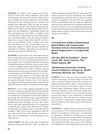 5 citations,
June 2004 in “The Journal of The British Menopause Society”
5 citations,
June 2004 in “The Journal of The British Menopause Society” Testosterone therapy can improve sexual satisfaction and mood in surgically menopausal women when used with estrogen, but its long-term safety and effects on naturally menopausal and premenopausal women are unclear.
 April 2017 in “Plastic and reconstructive surgery. Global open”
April 2017 in “Plastic and reconstructive surgery. Global open” Fetal scalp cells have more regenerative genes than adult cells, and decellularized muscle matrix is better for muscle repair than commercial alternatives.
 242 citations,
February 2016 in “Science”
242 citations,
February 2016 in “Science” Hair loss and aging are caused by the breakdown of a key protein in hair stem cells.
 196 citations,
September 2016 in “JCI insight”
196 citations,
September 2016 in “JCI insight” Ruxolitinib effectively regrows hair in most patients with severe hair loss.
 183 citations,
March 1982 in “JAMA”
183 citations,
March 1982 in “JAMA” Spironolactone is a safe and effective treatment for reducing excessive hair growth in women.
 174 citations,
November 2016 in “Cell stem cell”
174 citations,
November 2016 in “Cell stem cell” Different types of skin cells have unique genetic markers that affect how likely they are to spread cancer.
 159 citations,
October 2015 in “Science Advances”
159 citations,
October 2015 in “Science Advances” Blocking JAK-STAT signaling can lead to hair growth.
 124 citations,
June 2020 in “Cell Stem Cell”
124 citations,
June 2020 in “Cell Stem Cell” Fat cells in the skin help start healing and form important repair cells after injury.
 99 citations,
June 1999 in “The Journal of Clinical Endocrinology and Metabolism”
99 citations,
June 1999 in “The Journal of Clinical Endocrinology and Metabolism” Testosterone replacement may help some postmenopausal women with symptoms like fatigue and low libido, but more research is needed to fully understand its effects.
 40 citations,
April 2014 in “Genes & Development”
40 citations,
April 2014 in “Genes & Development” Hormones during pregnancy and lactation keep skin stem cells inactive, preventing hair growth.









